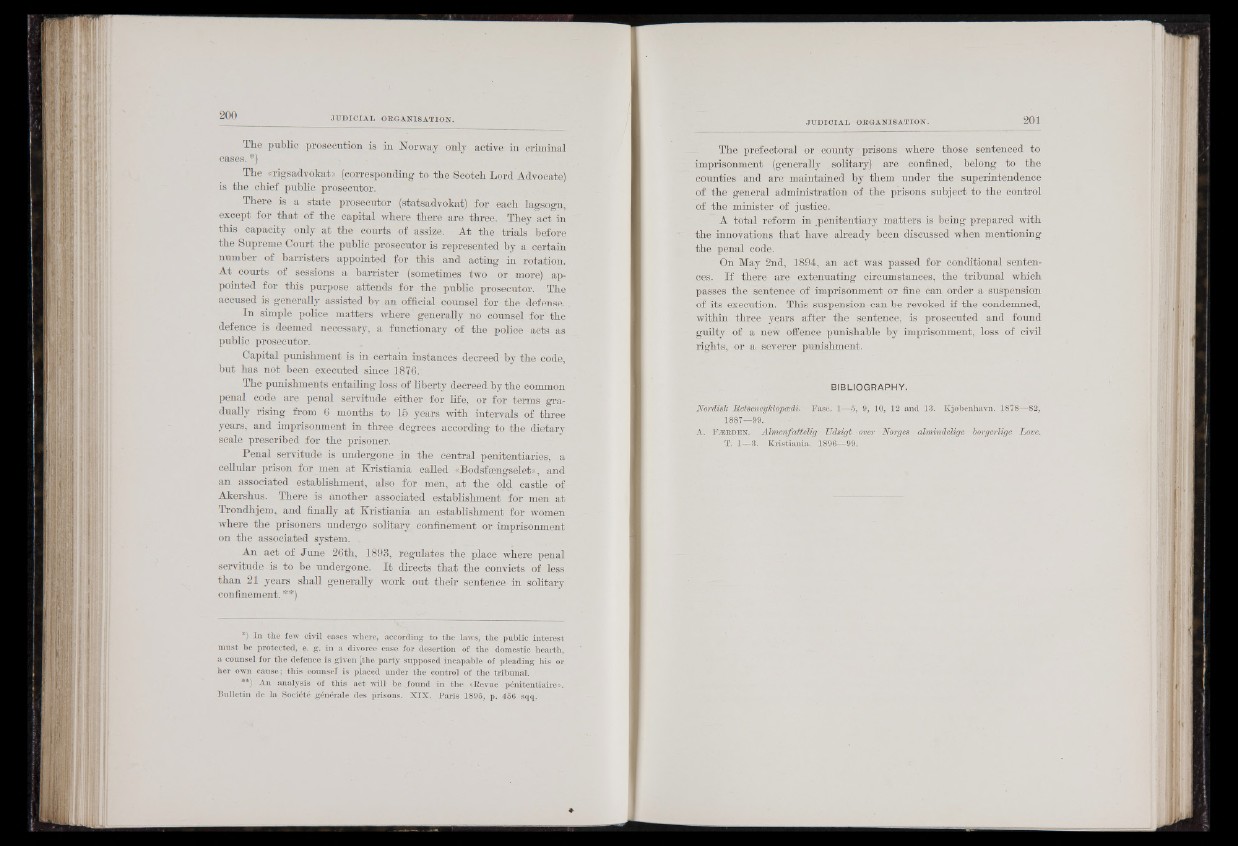
The public prosecution is in Noiyvay only active in criminal
cases. *)
The «rigsadvokat» (corresponding to the Scotch Lord Advocate)
is the chief public prosecutor.
There is a state prosecutor (statsadvokat) for each lagsogn,
except for that of the capital where there are three. They act in
this capacity only at the courts of assize. At the trials before
the Supreme Court the public prosecutor is represented by a certain
number of barristers appointed for this and acting in rotation.
At courts of sessions a barrister (sometimes two or more) appointed
for this purpose attends for the public prosecutor. The
accused is generally assisted by an official counsel for the defense.
In simple police matters where generally no counsel for 'the
defence is deemed necessary, a functionary of the police acts as
public prosecutor.
Capital punishment is in certain instances decreed by the code,
but has not been executed since 1876.
The punishments entailing loss of liberty decreed by the common
penal code are penal servitude either for life, or for terms gradually
rising from 6 months to 15 years with intervals of three
years, and imprisonment in three degrees according to the dietary
scale prescribed for the prisoner-.
Penal servitude is undergone in the central penitentiaries, a
cellular prison for men at K.ristiania called «.Bodsfsengselet», and
an associated establishment, also for men, at the old castle of
Akershus. There is another associated establishment for men at
Trondhjem, and finally at Kristiania an establishment for women
where the prisoners undergo solitary confinement or imprisonment
on the associated system.
An act of June 26th, 1893, regulates the place where penal
servitude is to be undergone. I t directs that the convicts of less
than 21 years shall generally work out their sentence in solitary
confinement. **)
*j In the few civil cases where, according to the laws, the public interest
must he protected, e. g. in a divorce case for desertion of the domestic hearth,
a counsel for the defence is given [the party supposed incapable of pleading his or
her own cause; this counsel is placed under the control of the tribunal.
**) -An analysis of this act will be found in the «Revue pénitentiaire».
Bulletin de la Société générale des prisons. XIX. Paris 1896, p. 456 sqq.
The prefectoral or county prisons where those sentenced to
imprisonment (generally . solitary) are confined^ belong to the
counties and are maintained by them under the superintendence
of the general administration of the prisons subject to the control
of the minister of justice.
A total reform in .penitentiary matters, is being prepared with
the innovations that have already been discussed when mentioning
the penal code.
On May 2nd, 1894, an act was passed for conditional sentences.
If there are extenuating circumstances, the tribunal which
passes the sentence of imprisonment or fine can order a suspension
of its execution. This suspension can be revoked if the condemned,
within three years after the sentence, is prosecuted and found
guilty of a new offence punishable by imprisonment, loss of civil
rights, or a severer punishment.
BIBLIOGRAPHY.
Nordisk Retsencyklopcedi. Fasc. 1—6, 9, 10, 12 and 13. Kjobenhavn. 1878—82,
i887—99.
A. FiEEDEN. Almenfattelig XJdsigt 'Over Norges almindelige borgerlige Love.